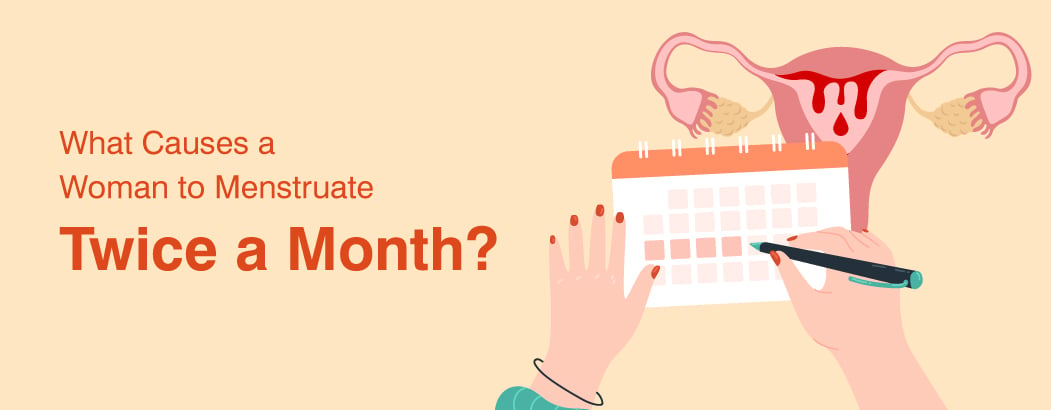What causes a woman to menstruate twice in a month?
October 14, 2023

What causes a woman to menstruate twice in a month?
What is a menstrual cycle?
Normal menstruation in adult women occurs due to numerous hormone fluctuations and the transformation of the internal parts of their bodies. It is commonly associated with a menstrual period, usually, every twenty-one to thirty-five days, averaging at twenty-eight days. These hormones, such as estrogen and progesterone, are very crucial during the menstrual cycle since they play a part in preparing the body for pregnancy (Fausto et.al). However, a rare condition of polymenorrhea also occurs and affects women who have two menstruals in one month. Such an anomaly should cause concern since it could signal some other health problems that ought to be managed. The reason behind this chaotic trend is multiple and there are for example menstrual cycles that could be associated with hormonal disbalance, stress, fluctuations in weight, some drugs, thyroid diseases, Polycystic ovary syndrome or anatomical disorder of genital tract.
Table of Contents
- What is a menstrual cycle?
- What causes a woman to menstruate twice in a month
- Hormonal Imbalances
- Uterine Issues
- Medication and Contraceptives
- Lifestyle Factors
- When to Seek Medical Advice
- Conclusion
What causes a woman to menstruate twice in a month
- Hormonal Imbalances
These hormones include estrogen fluctuation and the alteration of progesterone, which do cause a big difference in the monthly cycle. Specific hormones control the menstrual cycle; any imbalance of these hormones can cause irregularities.
Hormonal imbalance in certain conditions, like PCOS and thyroid problems, can result in disruption of the monthly period. For instance, PCOS causes high levels of androgens that interfere with the normal production of estrogen and progesterone, resulting in irregular periods with no periods entirely. Likewise, thyroid problems such as hypothyroidism and hyperthyroidism may be associated with irregularities in menstruation by changing hormonal balance.
Medical problems aside, issues such as anxiety, too much physical activity, and drastic changes in body fat can affect hormones and, hence, the menstruation process. Cortisol is a stress-related hormone that interferes with the production of reproductive hormones,s therefore causing irregular periods. Unhealthy levels of exercise or rapid weight reduction can upset the body’s hormonal balance and cause decreased estrogen levels, leading to a short-duration menstrual cycle or menorrhagia.
People with irregular menstrual flow should visit their physician to obtain an accurate diagnosis as well as treatment since correcting the cause of the problem will help them enjoy optimal reproductive health and wellness.
- Uterine Issues
Irregular bleeding patterns may arise due to issues related to the uterus, such as fibroids, endometriosis, and polyps.
- Fibroids are benign tumors of the uterus that may lead to prolonged and heavy bleeding, pain in the pelvis, and a frequent urge to urinate.
- Endometriosis is a case whereby the lining of the uterus develops outside the uterus, resulting in painful periods and heavy flow that may lead to infertility.
- Polyps: Uterine polyps refer to abnormal growth on the lining of the uterus and can cause irregularity in menstrual cycles, leading to cases of abnormally heavy or unpredictable periods.
The irregular and continuous flow of blood occurs since these conditions disrupt typical periodic desquamations. Unusual bleeding patterns show themselves as heavier than normal periods (menorrhagia), multiple episodes of slight bleeding between periods, and long-term menstrual bleeding called menometrorrhagia.
These are some common symptoms that may appear when a woman experiences these conditions,includinge pain during menses or intercourse as well as paiin thein lower abdomen region. Knowledge is important about these conditions and manifestations. Accurate diagnosis requires one to seek medical advice and go through tests such as ultrasounds, MRIs, or biopsies. The treatment alternatives can range from administering oral medicines or hormone treatments to mini-interventions or surgical options, depending on the severity of the obstruction.
These diseases may be successfully prevented or minimised in terms of symptoms when detected earlier through proper management. Furthermore, reproductive health may remain intact while such procedures are underway. Regular checks should be made in order to ascertain the level of improvements that have been accrued from the various medications. In addition, periodic visits to the doctor will help to examine the progression of the disease.
Medication and Contraceptives
- Medications and Birth Control: Some medications, as well as some variations in birth control methods, can alter the regular menstrual cycle.
- Contraceptive Changes: There can be disruption of the hormone balance in the body when one switches to a new contraceptive method, say from one category of birth control pills to another or adopts a different form of birth control, resulting in changes in one’s menstrual cycle.
- Emergency Contraception: Emergency contraception, otherwise known as “morning after pill”, distorts normal hormone level balance, and as a result, women might experience abnormal periods with variation in their lengths and flows.
- Hormone-Affecting Medications: Such include taking drugs that alter hormone levels, like some steroids, certain pills for thyroids, and pills given for chronic conditions. These changes may manifest in the form of abnormal menses, variations in flow,ord even short-term interruption of menstruation.
- Consultation with the healthcare provider: One should first consult a health professional for clarification of the possible effects that this may have on menstruation when switching to other medications or contraceptive methods. The healthcare provider may guide changes in the menstrual cycle and recommend the possible modification of the treatment regimen and/or contraception to avoid inconveniences with the menstruation process.
- Understanding Potential Impacts: It’s vital that, for any intended change, people first understand how it will impact menstrual cycles. The idea will thus help to deal with and make provision for any unavoidable changes in menstrual cycles as well as routine and other duties.
Lifestyle Factors
Lifestyle significantly influences the regularity of menstruation, for sure. Here is a detailed explanation presented in bullet points:
Poor Diet:
- Insufficient dietary supplies of some important substances may negatively impact hormone generation and equilibrium.
- Hormonal imbalance can also be caused by overconsumption of processed foods as well as excessive sugar intake.
- Low nutrient levels in diet affect reproductive well-being.
Excessive alcohol Consumption:
- Irregular menstruation occurs when alcohol disturbs the hormonal balance in females.
- Liver is vital for hormone metabolism and thus excessive drinking has a negative impact on this important body organ.
Smoking:
- The endocrine system may be disrupted by nicotine and other chemical constituents of cigarettes.
- Estrogen is produced during the breakdown of stored fat in the body and smoking can lower this estrogen level resulting into irregular menstrual cycles.
Imbalanced Hormones:
- Making wrong lifestyle choices may upset this fine equilibrium between estrogens and progestogens.
- Irregularity or absence of menstruation may be caused by hormonal imbalance.
Incorporating a Balanced Diet:
- A number of different fruits, vegetables, whole grains, and lean proteins are important in balancing hormones.
- Adequate vitamins, minerals, and healthy fat contribute to good reproductive health.
Regular Exercise:
- Physical exercises should be conducted on a weekly basis because it will assist with hormonal balance.
- Additionally, exercise helps in stress management, a condition that often links with menstrual irregularities.
Healthy Lifestyle Choices:
- Sleep adequacy and managing stress in a healthy way can positively affect hormonal balance.
- Maintaining low levels of stress, coupled with various relaxation methods may enhance menstrual cycle regularity.
Individuals may be able to achieve a regular menstrual cycle by taking note of their lifestyle habits in order to avoid disruptions that could have an impact on their general reproductive health.
When to Seek Medical Advice
- If you have two periods in a month, there might be a problem.
- In case of persisting irregularities and additional symptoms such as unusual bleeding, severe pain, or fatigue, then a health visit is recommended.
- Timeliness in seeking medical attention helps in the identification of underlying health problems.
- Early intervention helps in avoiding complications.
Conclusion
Understanding the menstrual cycle is very important for women’s health. These indicate the presence of polymenorrhea, where a woman suffers two menstruations per month. Also, what causes a woman to menstruate twice a month. These involve hormonal disturbances, uterus alteration, medication amendment,and other linked ones. Early intervention with regard to management and well-being is dependent on lifestyle changes. It is important for women to be aware of what their body is telling them all through the menstrual cycle, during pregnancy, and even generally in life as a whole because whenever one’s body becomes uncomfortable, it requires health attention, which automatically enhances wellness.








